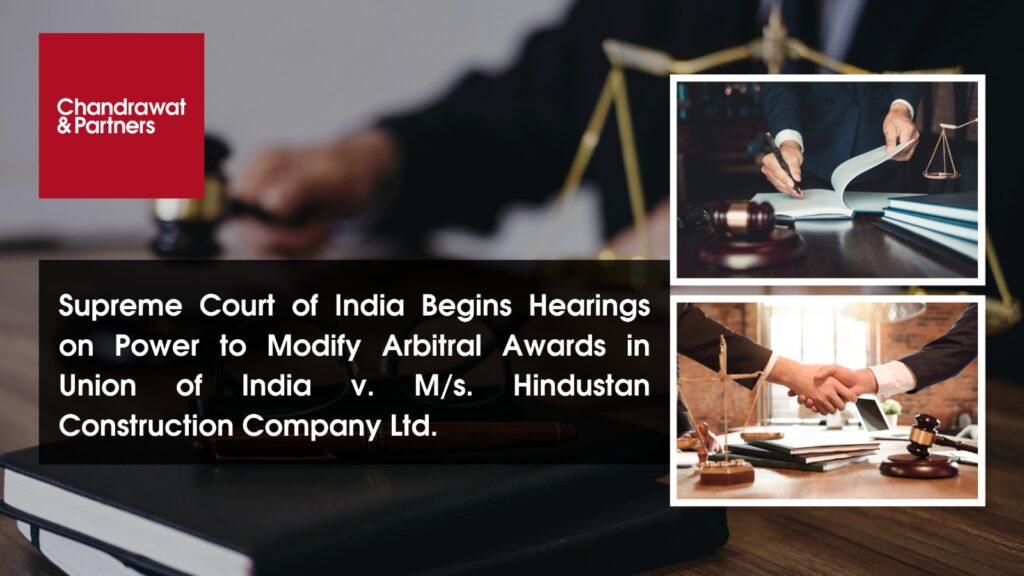Home > Recent Judgements >Supreme Court of India Begins Hearings on Power to Modify Arbitral Awards in Union of India v. M/s. Hindustan Construction Company Ltd.
Feb 19, 2025
Supreme Court of India Begins Hearings on Power to Modify Arbitral Awards in Union of India v. M/s. Hindustan Construction Company Ltd.
On February 18, 2025, a landmark hearing began in the Supreme Court of India regarding the scope of judicial intervention in arbitral awards under the Arbitration and Conciliation Act, 1996. The case, titled Union of India v. M/s. Hindustan Construction Company Ltd.”, will address a crucial question: Can the courts modify arbitral awards, or are their powers confined only to setting them aside or upholding them?
Understanding the Arbitration and Conciliation Act, 1996
The Arbitration and Conciliation Act, 1996, is central to resolving disputes through arbitration in India. Arbitration, as an alternative dispute resolution (ADR) mechanism, is meant to be faster and more efficient than traditional litigation. The Act provides a legal framework for both domestic and international arbitration, with the aim of ensuring that disputes are settled efficiently and impartially.
Two sections of the Act, Section 34 and Section 37, are particularly important when it comes to challenging arbitral awards:
- Section 34 allows a party to challenge an arbitral award before the courts, but only on specific grounds, such as procedural irregularities, violations of public policy, or issues related to the formation of the tribunal.
- Section 37deals with appeals against decisions made under Section 34, providing a mechanism for challenging the court’s decision to uphold or set aside the arbitral award.
While these provisions are clear on the grounds for challenging an award, the question of whether the courts have the authority to modify arbitral awards remains unsettled.
The Core Issue in Union of India v. M/s. Hindustan Construction Company Ltd.
The central issue in this case is whether courts have the power to modify an arbitral award under the existing legal framework. The case arises from a dispute between the Union of India and M/s. Hindustan Construction Company Ltd., where the company challenged certain aspects of an arbitral award.
The heart of the issue is whether the court can **alter the terms** of the award or simply decide whether the award should stand or be set aside. While Section 34 gives courts the authority to challenge and even annul an award, the ability to modify an award is not explicitly stated, leading to ambiguity in practice.
This case is particularly significant because if the Supreme Court grants itself the authority to modify arbitral awards, it could reshape the landscape of arbitration in India. It would mean that the judiciary might have more latitude to intervene in awards, potentially adjusting them for fairness or correcting errors that do not rise to the level of a procedural defect or violation of public policy.
Why This Case Matters
The outcome of *Union of India v. M/s. Hindustan Construction Company Ltd.* will have far-reaching implications for the arbitration framework in India. If the Supreme Court decides that courts can modify arbitral awards, it could provide greater flexibility to ensure that awards reflect fairness, justice, and accuracy. This could, for instance, allow courts to correct minor mistakes in the arbitral award without invalidating the entire decision.
On the other hand, a ruling that limits the court’s powers to setting aside or confirming the award could enhance the finality of arbitral awards. It would reinforce the principle that arbitration is intended to be an independent and self-contained process, free from excessive judicial interference, and thus encourage its use as an efficient alternative to litigation.
The Larger Picture: India’s Arbitration Landscape
India has been making efforts to improve its arbitration system in recent years. In 2015, the Arbitration and Conciliation (Amendment) Act was introduced to streamline arbitration proceedings and reduce delays. However, despite these efforts, concerns about judicial intervention in arbitration persist.
This case addresses a crucial aspect of those concerns: the degree to which the judiciary can intervene in arbitral awards. India’s arbitration laws have been evolving with the aim of making the country a preferred destination for international arbitration. The decision in this case could either support or challenge this vision, depending on how the Court defines the role of judicial review in the arbitral process.
Potential Implications of the Judgment
The ruling will define the balance between judicial intervention and the independence of the arbitration process. If the Court decides that it has the power to modify awards, it could increase the scope of judicial review and ensure that arbitral awards are more aligned with principles of justice. However, this could also slow down the arbitration process and reduce its appeal as a quicker, less formal alternative to litigation.
Conversely, if the Court limits its power to setting aside or confirming awards, it could reinforce the finality of arbitral decisions, ensuring that arbitration remains a fast and effective means of dispute resolution.
Conclusion
The *Union of India v. M/s. Hindustan Construction Company Ltd.* case is an important turning point for arbitration in India. The decision by the Supreme Court will provide much-needed clarity on the extent of judicial powers under Sections 34 and 37 of the Arbitration and Conciliation Act, 1996 especially with regard to the modification of arbitral awards.
As the hearings continue, the legal community eagerly awaits the Court’s decision, which will not only shape the future of arbitration in India but could also have broader implications for international arbitration practices. Whatever the outcome, this case will undoubtedly leave a lasting impact on how arbitral awards are treated in the Indian legal landscape.
For more information or queries, please email us at
[email protected]





